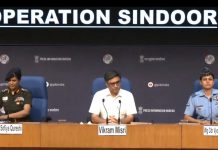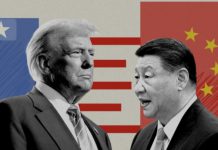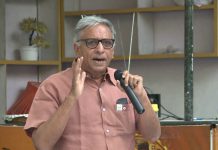Pratab Bhanu Mehta
The Ram Janmabhoomi-Babri Masjid dispute has long been accompanied by a sense of foreboding. The dispute has been historically charged, politically divisive and communally violent, putting both the nation and the Constitution at risk. So putting the dispute into mediation under the aegis of the Supreme Court evokes a resigned weariness. For decades, the Court abdicated its role and is now openly admitting that conventional legal and constitutional tools are powerless in the face of faith. So it is placing its hopes for “reconciliation” on mediation. The keenness to take this issue off the agenda is such that all parties hope India can move past the Ayodhya moment. It is hard to grudge an attempt at “reconciliation”.
But the weariness leading us to accept the mediation is also accompanied by a profound wariness of what might transpire. Before we come to the politics, it is hard not to remark on the spiritual hollowness of this moment. What is the framing of the mediation that should be acceptable? If the mediation is about getting the parties to the title dispute agree to an outcome, this remains something like a property mediation. If the framing is of reconciliation, then the question is: Who exactly is meant to reconcile with whom? And on what terms? The very framing of this dispute as one that requires reconciliation is an admission of defeat. It is an admission that the dispute is not going to be adjudicated on the terrain of truth, justice or due process.
The framing gives into one deeply problematic premise. The premise is that this is a dispute between two communities that require reconciliation. But who are these communities? Who was feeling unreconciled to their fellow citizens in the first place? Wasn’t the sense that “minorities” need to give a gesture to show their good intent already a nefarious piece of politics? Some Hindus want a temple. But what about those Hindus who think there was a temple on that site that was demolished in medieval India, but that it is still not sufficient grounds for building a temple there? What about those devotees who think that given our recent history, a just reconciliation would involve none of the traditional symbols — mosques and temples — triumphing over the site? Instead, the site should be an expression of a common hope for the future, a true Ram Rajya, not a reminder of sectarian divisions.
What about those whose keen devotional and historical sense tells us that Ram’s greatest triumph was that he did not become a totem in the games of sovereignty and power? In fact, there is a real danger, already apparent, that the cultural and spiritual sovereignty of Ram that was so creatively engineered by the brilliance of figures like Tulsidas is being overturned. In this construction, Ram is a constant, intimate presence: The Vaishnava turn that centred on “Sri Ramchandra kripalu bhaja man” was an audacious piece of spiritual thinking, the beating heart of Hinduism in North India. Those who believed all this were never in the need of being reconciled. In fact, they worried that Ram was being reduced to a coarse game of majoritarianism; diminished by being aligned with a hateful and reactionary politics and rendered spiritually bankrupt by being reduced to a totem of sovereign power. If this is a reconciliation between communities, will these voices be represented? Or is the reconciliation only for those who want to monopolise Ram as a vehicle for historical revenge, whose sense of feigned insecurity requires a catharsis?
Then there is the politics of the occasion. There are three traps: Timing, personal and framing. Although ostensibly the Court has taken the issue off the agenda by giving eight weeks, it would be foolish not to see that the timing of the attempt subtly helps the BJP. While the Court has probably acted with the best intent, the timing will lend fillip to one of BJP’s central claims. The claim is this: Hindu demands are taken seriously only when it is in power. The mediation may not result in much. But the underlying gesture involved in the Court claim that this is about “sentiment” has an elective affinity with BJP’s politics. Sending it to mediation can be claimed as progress.
I happen to think that Sri Sri Ravi Shankar’s appointment as mediator is deeply problematic. He has an openly declared position on the issue, has more or less intimidated institutions arguing that violence will ensue if a temple is not built, and represents the unsavoury aspects of a modern entrepreneurial figure to whom proximity to power matters more than spiritual values.
There is a third sense in which this mediation attempt is a trap. Suppose for moment that the only two alternatives on the table are building a temple at the site (with some mosque being built somewhere else), and not building a temple. Now imagine if the mediation fails to secure a temple. Let us not put too delicate a point on this. Who do you think will be blamed? On the other hand if a temple is secured, who do you think will claim the triumph? We may not know how the issue plays out in this election. But unless there is a larger political commitment to making sure that the outcome of the mediation is not politicised one way or the other, the issue will continue to simmer.
In this sense the Court has not understood the logic of its own claim that this is about sentiment. If it is about sentiment, why should three mediators or the small groups have any more imprimatur than the Supreme Court of India? The Allahabad High Court‘s judgment was a case of panchayati justice. But it did shrewdly realise that putting the onus on parties to find a solution makes them possible political targets.
There have been past attempts at mediation. The fact that they were overtly political was actually their virtue, not their failing. At least they openly acknowledged there is a politics to this. If this indeed is about sentiment, then India needs a larger political settlement against communalism, against the idea that our conception of citizenship and nationhood is tied to some story about medieval India that both the Left and Right have peddled. It remains to be seen whether this mediation can turn the needle on these large issues. For India’s sake, we hope the mediation can transcend the limitation of its framing, and think of a truer reconciliation, one where no community triumphs. Only India and its constitutional values does.
The writer is vice-chancellor of Ashoka University. Views are personaourtesy: Indian Express
Courtesy: Indian Express

















